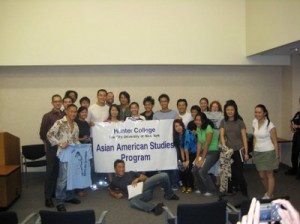 By Amanda
By Amanda
On the similar topic of the relevance of “Asian-American,” there’s an interesting article at Diverse Education discussing the value of ethnic-specific courses versus pan-Asian American courses. With the increasing presence of students of Asian descent, universities have added more ethnic-specific courses to their curriculum, such as “Japanese American Personality” and “Cambodian American Culture and Community.” Asian students have responded enthusiastically, and are eager to explore their own roots and identity, but educators also say that there’s value in learning about the pan-Asian American experience. Dr. Gary Okihiro, a professor at Columbia University, says:
I certainly understand that individual students want and need to locate themselves… But sometimes their interests are limited to their perceived sense of self when, in fact, they already belong to multiple constituencies and have multiple identities. Our responsibility as teachers is to get them to see that.
Oftentimes in places like the Bay Area which have significant Asian-American populations, students tend to segregate themselves into ethnic subgroups: Chinese-American students only hanging other Chinese-Americans, Korean-Americans only hanging out with other Korean-Americans, for example. However, by doing so, they also fail to see that there are common struggles and goals that all Asian ethnic groups experience. History professor at the University of Wisconsin-Milwaukee, Dr. Chia Youyee Vang, shares this anecdote:
Most students in Vang’s “Hmong Americans” class don’t know how badly marginalized their forebears were as refugees, despite many of them aiding the U.S. military during the Vietnam War.
“Many students ask, ‘Was this just a Hmong thing?’” Vang says. “That’s when I get into the Chinese Exclusion Act or the Japanese internment camps. Certainly, some issues are specific to an ethnicity, but there is a long legacy of discrimination against Asians in this country.”
So to answer Jeff’s question of whether the term “Asian-American” is still relevant: I think it is. Just as not all people of color are the same, certainly not all Asian-Americans are the same; and yet, all of us still need proper representation in the government, the media, and the definition of whatever it means to be “American.” Especially now with the Texas State Board of Education’s recent approval of a revised social studies curriculum that does not teach civil rights, Asian-Americans need to remember that our collective voices have not always been heard.
ABOUT AMANDA: Amanda Zhang was born in China and has spent most of her life in Boston, Massachusetts and Seattle, Washington. She’s into traveling, pop culture, creative pursuits, social activism, and blogging. She currently attends Wellesley College and is in the Class of 2013.








